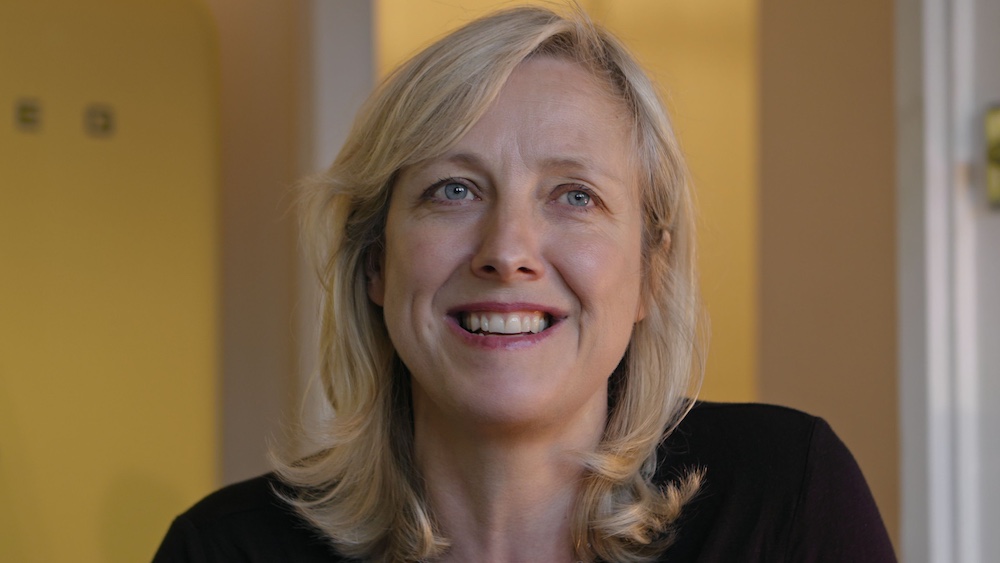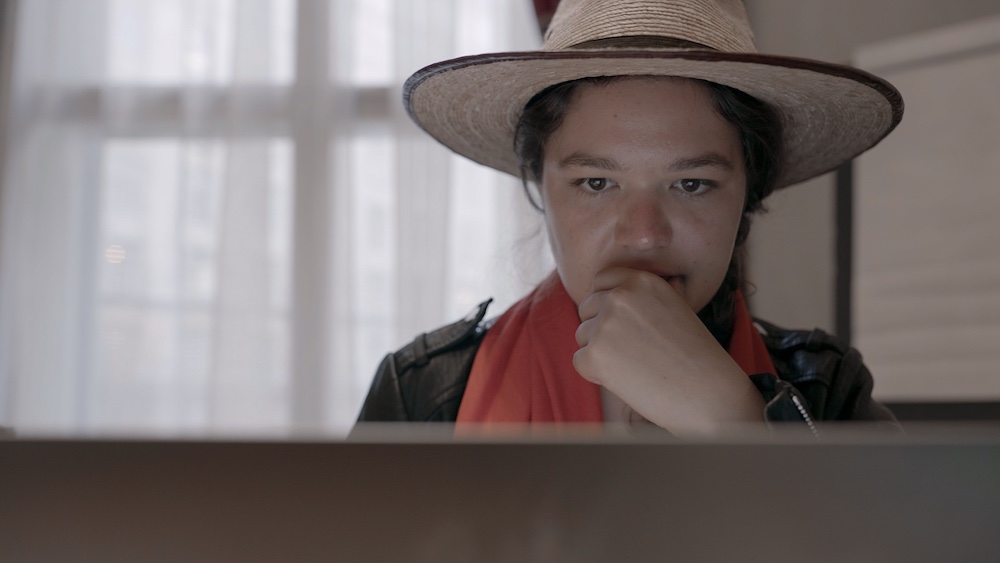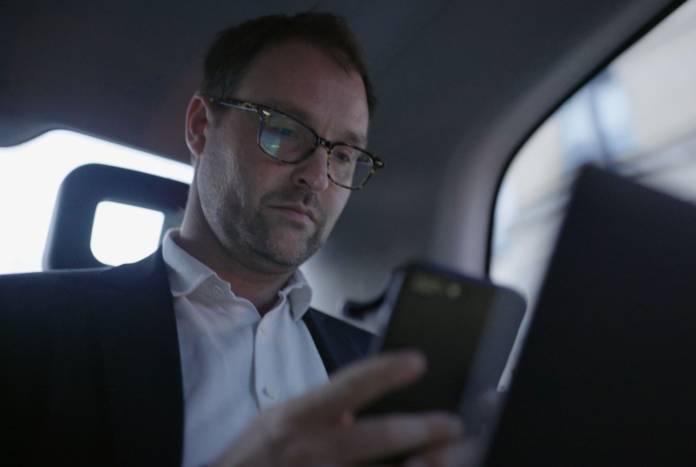Social network Facebook has faced fierce criticism for its dubious privacy practices for years. In the beginning, it was tracking user activity via “Like” button clicks and selling it to advertisers along with personally identifiable information. This info would be used to serve users with relevant digital ads.
“Maybe it’s because I grew up with the Internet as a reality, the ads don’t bother me all that much,” says a student in a Parsons School of Design ad targeting class, in the beginning of Karim Amer and Jehane Noujaim’s new Netflix documentary The Great Hack, out July 24. Then she pauses for a moment as if reevaluating her comment, before asking, “When does it turn sour?”
That’s what her instructor, David Carroll—an associate professor at Parsons teaching digital media and developing apps—and a slew of others including journalists and politicians aim to uncover in the highly informative, almost two-hour expose of the Facebook-Cambridge Analytica scandal.
Being served relevant ads for products and services like microwave ovens, custom kitchen deliveries, refrigerators, and color TVs is one thing.
But once the news broke in March of 2018 that Facebook had allowed Cambridge Analytica, a British political consulting firm, to steal the personal data of 87 million-plus users, intending to target them with propaganda in order to sway their votes in the 2016 presidential election in the US and Brexit in the UK, the public finally began to understand the dangers of sharing their personal data with the social media giant.
The thrilling documentary, which follows the Cambridge Analytica scandal as it happened, demonstrates that the consequences of this breach in user trust is worse than ever previously imagined. But how did Facebook go from a “connected world where everybody could share each others’ experiences and feel less alone” to a battlefield that divided nations?
Such a transformation required a lot of effort and “The Great Hack” introduces many of the key players in the scandal, explaining their roles and motivations.
There’s Alexander Nix, the former CEO of the now-defunct Cambridge Analytica, which billed itself as the world’s leading data-driven communications firm on the path to becoming a billion-dollar company. Nix, who doesn’t take part in the film but appears in plenty of footage, including a damning hidden video, had already used communication warfare to help sway elections in developing countries and felt that his “weapon-grade” tactics on Facebook were finally perfected enough to use on Britain and the US.
Focused on building a strong elections business for Republican politicians in the US, Cambridge Analytica started working with Ted Cruz and propelled him to a Republican nomination frontrunner. Once Trump secured the spot, however, the company began working with him, using the existing voter data and research that it had already collected.

But how did the company amass its 5000 data points on every American user in the US? Enter ex-Cambridge Analytica employee Christopher Wylie. Wylie was the first of whistleblower prepared to talk to Carole Cadwalladr, a British journalist for The Guardian who broke the story of Cambridge Analytica and its connection to the Brexit campaign.
Wylie is the data scientist who helped set up the company’s “full-service propaganda machine” by first getting his paws on University of Cambridge research associate Aleksandr Kogan’s app that allowed Cambridge Analytica to collect the personal details of millions of Facebook users.
Facebookers would be presented with a personality quiz, for example, and the underlying app had special permission to harvest not only their data, including status updates, likes, work info, payments, and locations but also that of their friends. So with a couple hundred thousand profiles, Cambridge Analytica could now make predictions about their personalities, which can deduce behavior, and ultimately voting choices. Now it was time to target every “persuadable” voter in the US, with fear-stoking personalized content — blogs, websites, articles, videos, and ads—so they’d vote more conservatively, experimenting with psychology to obstruct the traditional democratic process.
But is Wylie coming forward because he’s repentant or bitter? Julian Wheatland, the former COO/CFO of Cambridge Analytica/SCL Group, is the sole establishment figure interviewed in the film. He mourns the demise of the company that he believes was a hotbed of innovation—and suggests that Wylie only came forward as a whistleblower because, after leaving Cambridge Analytica for another company in 2014, he was resentful about losing the Trump account to Cambridge Analytica.
But the most compelling voice in the film has to be Brittany Kaiser’s. The one-time idealistic intern in former president Barack Obama’s groundbreaking political campaign, she helped run his Facebook account—and revolutionize the way social media reaches voters—before turning to human rights campaigning and lobbying. When she didn’t see the monetary gain she had hoped for, she was only too eager to take her expertise to Cambridge Analytica in December of 2014 and pitch far-right political companies as the company’s new Director of Business Development.
Yet after Cambridge Analytica closed and a friend asked her if this was how she wanted to be remembered by history, she switched sides yet again. With the encouragement of British writer Paul Hilder, whose own goal is to shine a light on how data’s been misused and abused, Kaiser, who’s been hiding out from “two administrations and the most powerful companies in the world” in infinity pools in Thailand, is ready to come clean about her former company’s nefarious activities.
On her way to testifying before the UK Parliament’s Digital, Culture, Media and Sport (DCMS) Committee’s fake news inquiry, to which Wylie and Nix were also compelled to give testimony, she says she’s “not that interested in standing up for powerful white men anymore who obviously don’t have everybody’s best interest at heart.”

What’s troubling is that Kaiser, who so eloquently describes how Cambridge Analytica swayed voters on engagement-heavy Facebook, can also say without irony, “The problem in politics is that people can’t understand or work together so nothing gets done,” without understanding her role in perpetuating that divide.
In another scene, after it emerges that during Kaiser’s time with Cambridge Analytica she’d traveled to Russia, visited with WikiLeaks founder Jullian Assange (who leaked Hillary Clinton’s emails after they were stolen by Russia), and donated to WikiLeaks, the former Business Development director who first pitched the Trump campaign can’t fathom why she’d be perceived to be at the center of “some big, crazy thing.”
At other points, she seems to alternate between defensiveness and glee about her part in the Cambridge Analytica scandal. In one particularly strange moment, she gets giggly when Nix, her former boss, mentor, and friend, texts her with some kind words and a winking emoji after she testifies before the DCMS fake news inquiry. It’s as if she’s still under the spell of the man who upon meeting her threatened to get her drunk so she’d spill all of her secrets.
Noticeably absent from the film is Facebook. The closest viewers get is a quick interview with Facebook-investor-turned-
Even though Cambridge Analytica filed for bankruptcy and closed in the wake of the scandal, Facebook remains widely used and is still a targeted platform for election meddling. But the story is bigger than even Facebook.
As professor Carroll and journalist Cadwalladr point out, we mustn’t stop the inquiries into how tech companies, “the good ones,” run by “nice guys in hoodies connecting the world” including Twitter, Alphabet, and many more, are still using and misusing our data.
For Carroll, it meant attempting to get his data from SCL, Cambridge Analytica’s parent company in Great Britain, so he can learn how our digital traces on apps that are supposed to connect us, like Facebook, which was used to incite genocide in Myanmar, and WhatsApp, which was recently implicated in the dissemination of fake news that swayed Brazil’s elections, are being used against us.
For Cadwalladr, it’s about whether it’s possible to ever have a free or fair election again. After an 18-month investigation, the UK Parliament ruled “no” as long as Facebook and other tech giants remain unaccountable.
So the journalist makes an appeal to tech leaders, such as Mark Zuckerberg, Sheryl Sandberg, Sergey Brin, Larry Page, and Jack Dorsey at a recent TED Talk, asking, “Is this what you want? Is this how you want history to remember you, as the handmaidens to authoritarianism?”
Then she turns to the audience. “And my question to everybody else is, ‘Is this what we want? To sit back and play with our phones as darkness falls?’”
In other words, instead of joining that next Facebook Group or watching a fake Nancy Pelosi video on the app, users’ time might be better spent off the app fighting authoritarianism, at least until the social media giant begins putting customers ahead of diabolical advertisers.
THE GREAT HACK
Premieres Wed/24
Netflix
More info here.








